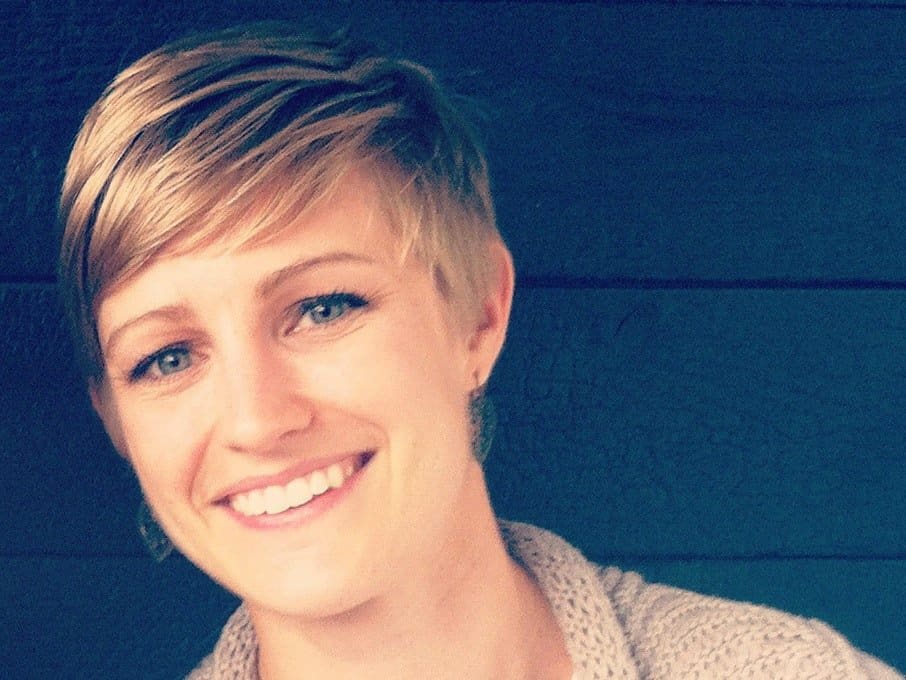 Today’s “aha” moment is by Lindsey M. Trozzo (BA, Biola University, Biblical and Theological Studies; MA, Talbot School of Theology, NT). Trozzo is ABD in her PhD work at Baylor University, where she is writing her dissertation is on ethics in John’s Gospel and utilizing Rhetorical Criticism to uncover John’s non-propositional ethic. Trozzo is also working at Texas Christian University as the Research Assistant to the Bradford Chair (David Moessner), where, along with researching and teaching, she is coordinater the Second Century Seminar and manages subscriptions to Novum Testamentum Supplement Series (Brill).
Today’s “aha” moment is by Lindsey M. Trozzo (BA, Biola University, Biblical and Theological Studies; MA, Talbot School of Theology, NT). Trozzo is ABD in her PhD work at Baylor University, where she is writing her dissertation is on ethics in John’s Gospel and utilizing Rhetorical Criticism to uncover John’s non-propositional ethic. Trozzo is also working at Texas Christian University as the Research Assistant to the Bradford Chair (David Moessner), where, along with researching and teaching, she is coordinater the Second Century Seminar and manages subscriptions to Novum Testamentum Supplement Series (Brill).
********
I often think that students take the view that one of my jobs as a professor is to reassure them that the Bible does not say anything that they do not already think, and to show how when it says something outrageous it does not mean it.
~ John Goldingay
This was certainly my mindset when I began my biblical education. “I’m not sure,” was a phrase I avoided like the plague. For as long as I can remember, I have been driven to say, “I know. Now let me show you why.”
At home, at school, and at church, I worked as hard as I could so that I would be able to raise my hand with the right answer. “I’m not sure” was a bad place.
This inclination toward certainty extended into my academic life: K-12 Christian school, B.A. in Biblical Studies from an Evangelical university, M.A. in NT from an Evangelical seminary, PhD program in Biblical Studies (in progress). I met success in academic life.
And for a good while, my accumulation of answers was quite empowering.
At first (as the joke goes) seminary “taught me just enough to make me dangerous”— meaning, my seminary-trained and self-inflated ego could out-argue others on a given Bible topic. This wasn’t only a fault of my particular educational system. Broadened scholarly horizons, on their own, would simply fuel me with different data to make different arguments – but for the same problematic purpose.
As a professor of mine has joked, “You can make the data say anything you want – if you’re smart enough.” So my “aha moments” aren’t necessarily about escaping conservative dogmatism.
They are about escaping dogmatism on all sides.
I would say I am experiencing an “aha evolution,” one still in progress, where I’m learning to identify my tendency to look to the Bible to affirm things I think I already know (rather than looking to the Bible to learn something new).
This evolution is about learning to live somewhere in the middle, about becoming more comfortable saying, “I’m not sure.”
The most significant moments in this evolution have not come from my own close readings of Scripture, nor from grating tensions encountered in a conservative classroom or church setting, nor from a moving and persuasive article or essay.
Certainly scholarly arguments have transformed my views about very important issues. Certainly my own close readings of the text have led me to concede that the “biblical stance” on any given topic is not as straightforward as I would like to admit. Yet still, I attribute my personal evolution to something much simpler:
I started listening to people who were different than I was.
In many ways, I am grateful for the conservative context in which I grew up. I was well-loved, and my own conservative community was of the gracious variety. But one detriment of growing up in a close-knit Evangelical faith community (at least in my experience) is that everyone agrees on everything – or at least on the important things.
Dissenting voices are treated with a special brand of caution. Even in the most gracious communities, those dissenting voices are certainly not given the same space as the voices of insiders. For me, this dynamic continued into my academic context as well, since I chose to attend a university and a seminary that resembled the conservative setting of my upbringing.
Though such an approach was never directly prescribed, reading in such a community fueled my tendency to treat the Bible as a means to affirm my stalwart doctrinal positions. Reading in such a community strengthened my sense that “I’m not sure” was a bad place.
It’s not for me to say whether other members of this reading community had the same motivations – perhaps some were actively trying to disengage their presuppositions and see whether some long-held beliefs might be challenged by the voice of the text. But that was not my approach at the time.
Slowly I began to feel a growing chasm between my close-knit Evangelical scholarly community and the diverse community with whom I lived everyday life. I began to see how the positions I had become so equipped to defend simply did not line up with the common human decency I saw expressed by those whom I would have called ill-informed, untrained, or even heretical.
Good people with amazingly powerful common sense had me wondering, “What if we are wrong? What if I am wrong?” It was this, the laying aside of “I know” and the taking up of “I’m not sure,” that invited the conversations that would shape a new perspective for me.
Reading and discussing the Bible within a diverse community (and mostly listening), I gradually learned a more generous approach to the Bible, to others, and to myself. A few members of this diverse community stand out (though there are many others):
- My profoundly “liberal” freshman roommate who lived a Gospel that extended unquestioning love to those our community excluded and judged most.
- My upstanding, inspiring, charitable twin brother whose fearless vulnerability and courageous pursuit of accepting himself and others as the image of God challenged my own deep-rooted prejudice.
- My unique and freethinking husband whose unconditional love for me and openness to every person I’ve seen him encounter stood in stark contrast to my own principled self-importance and need to be right.
Listening to these voices resulted in new questions and led me to more flexible answers than I had previously been able to see in the text.
Becoming an observer of my tradition and myself, I began to realize the inconsistency of interpretation among many Christian communities who adopted a stricter hermeneutic on some issues and a more flexible hermeneutic on others.
Mostly, this community helped me to acknowledge where I was making the text say more than it was really saying, where I was forcing the text to take a stronger position than it really took, where I was overlooking complications and complexities in the biblical witness.
Scholarship has since affirmed that evolution that was birthed in experience and community. I was pleased to find that these more flexible ways of reading has long-held a place in the wider world of biblical scholarship—beginning with premodern communal interpretation, continuing with the rise of liberal theologians, and extending into the academy today.
I am happy that our postmodern context allows similar “concessions” for those of us who read the Bible from a theological standpoint. For me, self-reflective and self-aware reading is only possible when I ground myself in a diverse community.
We still all read from a subjective standpoint, and this is something I’m not sure we can escape. But by reading in community, deliberation can free us from dogmatism. I hope that I will continue to listen to my friends who will help me to read reflectively and engage deliberatively, to err on the side of love, and to readily admit “I’m not sure.”
Some resources on reading in community (thanks to my own community for these):
The Blue Parakeet: Rethinking How You Read the Bible, Scot McKnight
Whose Community? Which Interpretation?: Philosophical Hermeneutics for the Church, Merold Westfall
Hermeneutics: An Introduction, Anthony C. Thistelton
The Fall of Interpretation: Philosophical Foundations for a Creational Hermeneutic, James K. A. Smith
The New Testament and the People of God, NT Wright
Seeing the Word: Refocusing New Testament Study, Marcus Bockmuehl
Practicing Theological Interpretation: Engaging Biblical Texts for Faith and Formation, Joel B. Green
Reading In Communion, Stephen E. Fowl
Remembering Jesus: Christian Community, Scripture, and the Moral Life, Allen Verhey
Reading Texts, Seeking Wisdom: Scripture and Theology, eds. David F. Ford and Graham Stanton
The Promise of Scriptural Reasoning, eds. David F. Ford and C. C. Pecknold
Scriptural Interpretation: A Theological Exploration, Darren Sarisky
Theology, Rhetoric, Manuduction, or Reading Scripture Together on the Path to God, Peter M. Candler, Jr.

